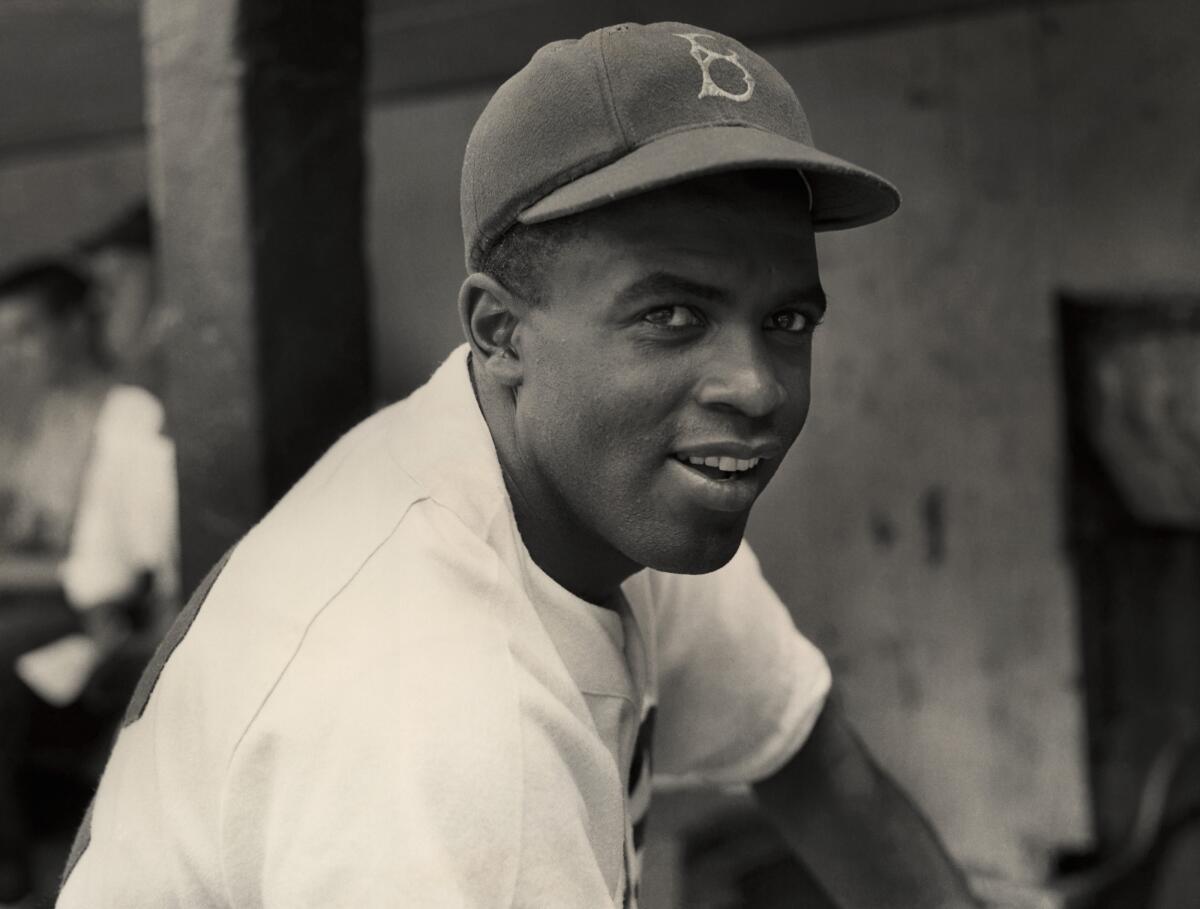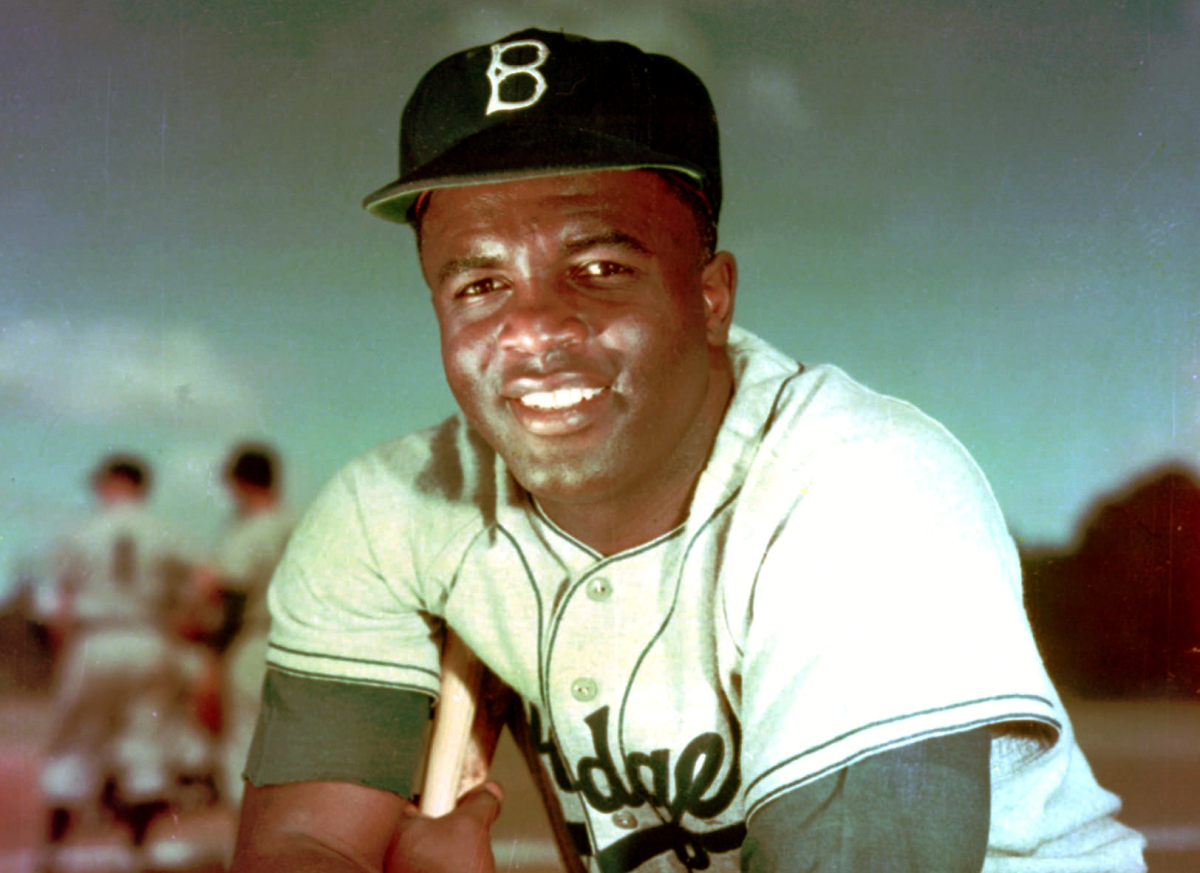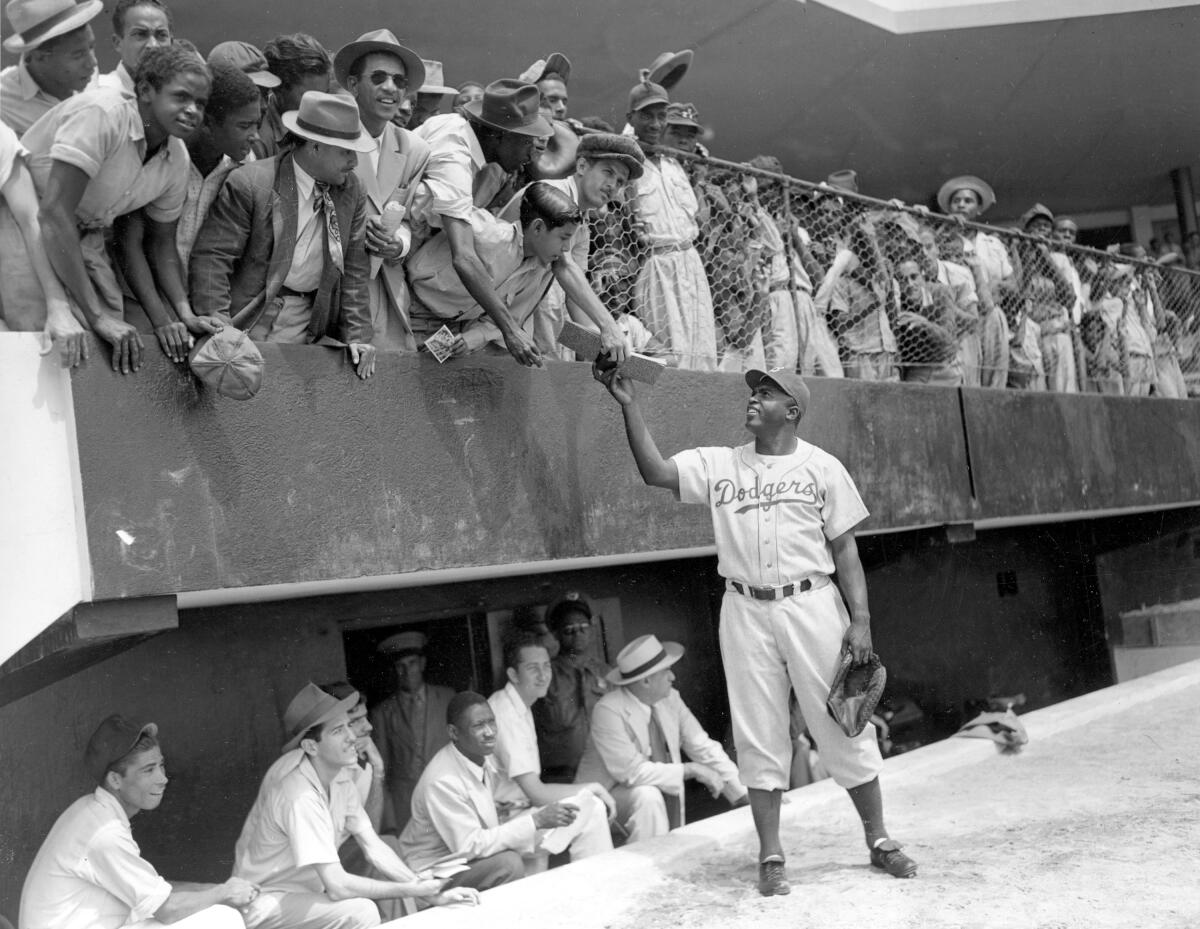Dodgers Dugout: Every day should be Jackie Robinson Day

- Share via
Hi, and welcome to another edition of Dodgers Dugout. My name is Houston Mitchell, and today is a very special day, so it’s time for the annual Jackie Robinson newsletter, with the entire newsletter devoted to Robinson.
Are you a true-blue fan?
Get our Dodgers Dugout newsletter for insights, news and much more.
You may occasionally receive promotional content from the Los Angeles Times.
On April 15, 1947, Robinson made his major league debut at Brooklyn’s Ebbets Field in front of crowd of 26,623. He walked and scored a run in the Dodgers’ 5–3 victory. Thus began one of the most amazing careers in sports history. Robinson broke the color barrier and faced challenges few major leaguers ever had to endure.
Enjoying this newsletter?
Your support helps us deliver the news that matters most. Become a Los Angeles Times subscriber.
Some players on his team didn’t want to play alongside him, starting a petition saying they would rather not be his teammate. Manager Leo Durocher’s response: “I don’t care if the guy is yellow or black, or if he has stripes like a ... zebra. I’m the manager of this team, and I say he plays. What’s more, I say he can make all of us rich. And if any of you can’t use the money, I will see that you are traded.”

Players on other teams called him every racial insult. Some opposing managers were worse. Fans, some of them little kids parroting what their parents were saying, called him vile names. And Robinson had, and could have, only one response: No response. Give in and lose his temper, then the racists would say “See, his kind aren’t strong enough to play in the majors.” It would be used as leverage to kick him out and keep the majors “pure.”
So, Robinson took it. But he not only had to take it, he also had to play at a high level to prove Black people could play in the majors. He ran the bases with abandon. He excelled as a fielder no matter where they put him. He led the Dodgers to victory after victory, including their first World Series title in 1955.
Imagine trying to do your job every day with thousands of people surrounding you, hurling racist taunts. Imagine going on the road and not being able to stay in the same place as your co-workers, but being forced to room with someone across town. Imagine having a wife and child who have to go through the same thing. Imagine a policeman coming into your workplace and threatening to arrest you and shut down your business unless you left, because they don’t appreciate “your kind” in their city. Imagine getting death threats every day in the mail.
Most people would not be able to do what Robinson did. He set the example that players such as Larry Doby of Cleveland, who broke the color barrier in the American League, were able to follow.
It’s sad that sometimes I will hear fans of other teams complain that Robinson’s No. 42 is retired and listed alongside the numbers of the legends from their team, because “he didn’t play for their team.”
Even now, some people try to find flaws that Robinson had to cut him down. What they don’t realize is that pointing out whatever flaws he had doesn’t make him seem less impressive — but even more impressive. It shows he was an imperfect man who performed one of the most perfect human achievements of all time.

But words don’t adequately describe what Jackie Robinson did or what he went through. They can’t. It’s embarrassing to even try.
What’s a good way to celebrate Jackie Robinson Day? Find anyone you know under the age of 18 and make sure they know who Jackie Robinson was and what he did. Don’t let his memory be forgotten. Show them the movie “42.” Give them a book on Robinson. Or sit down and talk to them about him. It’s the best gift you can give them.
In his own words
Some of the best quotes from Jackie Robinson:
“Plenty of times I wanted to haul off when somebody insulted me for the color of my skin, but I had to hold to myself. I knew I was kind of an experiment. The whole thing was bigger than me.”
“A life is not important except in the impact it has on other lives.”
“I’m not concerned with your liking or disliking me. All I ask is that you respect me as a human being.”
“Life is not a spectator sport. If you’re going to spend your whole life in the grandstand just watching what goes on, in my opinion you’re wasting your life.”
“There’s not an American in this country free until every one of us is free.”
“During my life, I have had a few nightmares which happened to me while I was wide awake.”
“I’m grateful for all the breaks and honors and opportunities I’ve had, but I always believe I won’t have it made until the humblest Black kid in the most remote backwoods of America has it made.”
“Many people resented my impatience and honesty, but I never cared about acceptance as much as I cared about respect.”
“Negroes aren’t seeking anything which is not good for the nation as well as ourselves. In order for America to be 100% strong — economically, defensively and morally — we cannot afford the waste of having second- and third-class citizens.”
“Blacks have had to learn to protect themselves by being cynical but not cynical enough to slam the door on potential opportunities. We go through life walking a tightrope to prevent too much disillusionment.”
“Above anything else, I hate to lose.”
In the words of others
—”A credit to baseball and to America.”
Branch Rickey, general manager of the Brooklyn Dodgers
—“To do what he did has got to be the most tremendous thing I’ve ever seen in sports.”
Pee Wee Reese, teammate of Jackie Robinson
—“The greatest moment in the history of baseball.”
MLB Commissioner Rob Manfred
—“He gave the Black community a sense of hope, a sense of pride.”
John Lewis, civil rights leader
—”I didn’t know baseball from ping pong. But the point was that he had broken in. I grew inches that day. I puffed out my chest.”
Archbishop Desmond Tutu
—“Jackie’s character was much more important than his batting average.”
Hank Aaron
—”Jackie Robinson made his country and you and me and all of us a shade more free.”
Roger Kahn, author of “The Boys of Summer”
—“There’s a direct line between Jackie Robinson and me.”
Former President Barack Obama
—“He was the greatest competitor I have ever seen.”
Duke Snider, teammate
—”There was never a man in the game who could put mind and muscle together quicker than Jackie Robinson.”
Rickey
—”Jackie, we’ve got no army. There’s virtually nobody on our side. No owner, no umpires, very few newspapermen. And I’m afraid that many fans may be hostile. We’ll be in a tough position. We can win only if we can convince the world that I am doing this because you’re a great ballplayer, and a fine gentleman.”
Rickey
—”Jackie Robinson is the best I’ve seen. Robinson is the perfect blend of ballplayer. He has creativeness and imagination. Every move he makes from the minute he steps onto the field is designed to beat the other club. He’s constantly asking himself, at bat or on the bases, ‘what can I do to beat the other guy?’ That’s the kind of ballplayer that wins pennants.”
Fresco Thompson, assistant farm director for the Dodgers when Robinson played his first game
—”Today we must balance the tears of sorrow with the tears of joy. Mix the bitter with the sweet in death and life. Jackie as a figure in history was a rock in the water, creating concentric circles and ripples of new possibility. He was medicine. He was immunized by God from catching the diseases that he fought. The Lord’s arms of protection enabled him to go through dangers seen and unseen, and he had the capacity to wear glory with grace. Jackie’s body was a temple of God. An instrument of peace. We would watch him disappear into nothingness and stand back as spectators, and watch the suffering from afar. The mercy of God intercepted this process Tuesday and permitted him to steal away home, where referees are out of place, and only the supreme judge of the universe speaks.”
Jesse Jackson, delivering a eulogy for Robinson
For more on Robinson, I recommend visiting jackierobinson.com, where several of the above quotes and much more can be found.
And finally
MLB honors Jackie Robinson before the 1972 World Series and he gives a speech. Watch and listen here.
Until next time...
Have a comment or something you’d like to see in a future Dodgers newsletter? Email me at houston.mitchell@latimes.com, and follow me on Twitter at @latimeshouston. To get this newsletter in your inbox, click here.
Go beyond the scoreboard
Get the latest on L.A.'s teams in the daily Sports Report newsletter.
You may occasionally receive promotional content from the Los Angeles Times.




